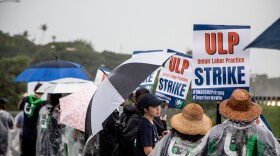A new report from the University of Hawaiʻi Economic Research Organization found that COVID-19 continues not only to impact resident health, but also quality of life.
UHERO, in partnership with the Pacific Alliance Against COVID-19, surveyed more than 1,600 residents across the state over the age of 18 in fall 2022. This is the second survey to be conducted to inform public health programs and lawmakers on the impacts of COVID-19 and other disasters while addressing system health disparities.
Participants were asked questions ranging from health, their perception of COVID-19, and food security. But the most striking impact is on employment.
Earlier this week, UHERO Executive Director Carl Bonham told lawmakers the state continues to experience a worker shortage. But added he believes this could be due to residents not holding two, or more, jobs.
"If I work 15 hours at Zippy's and 20 hours at Long's — then I have two jobs. But I only get counted in the household survey one time," said Bonham. "In Hawaiʻi, we tend to have a higher number of multiple jobholders. Unfortunately, we don't have current data for this."
Another explanation could be the impacts of long COVID.
"We found the first evidence that long COVID is affecting employment," said Raul Juarez, HMSA-endowed professor in health economics at UHERO and lead author of the report.
"In November, an even higher proportion of individuals reported having both long COVID symptoms and experiencing unemployment," Juarez said.
According to Juarez, 47% of unemployed individuals reported having long COVID in November. That's a five-point increase from the last report's findings in May 2022.
"In contrast, the rate for long COVID for employed individuals is only 30%," Juarez said.
UHERO's study also found the impacts of the pandemic continue to affect local households. Nearly 30% of residents in the study reported their savings being depleted, and 1 in 7 have been unable to pay their bills.
More than 4% of individuals reported losing their job, and 7% of individuals were furloughed or reduced their working hours since May 2022.
Food insecurity among residents continued to remain high with 8.2% of respondents saying they didn't have enough food. That's a slight decline from the last report, when it was 8.4% of participants reported low food security.
Meanwhile, COVID infections have increased since the May 2022 report.
In November, more than 45% of respondents had tested positive for COVID-19 at least once, compared to the nearly 25% in May.
According to the study, young adults, Native Hawaiian, Pacific Islander, and Filipino populations continue to see higher infection rates — as well as among unvaccinated and unboosted individuals.
"Overall, as we enter a new phase of the pandemic, Hawaiʻi's populations are becoming more confident that the worst of the pandemic is behind us, driving COVID-19 booster uptake down," Juarez said.
"Significant impacts exacerbated by the pandemic, including long COVID, mental health issues, and the impact of long COVID on unemployment may pose significant challenges that warrant monitoring."






